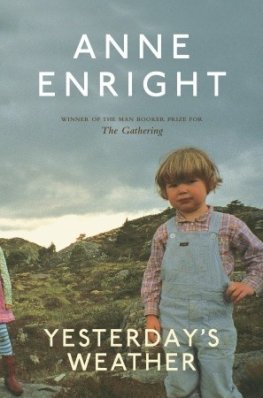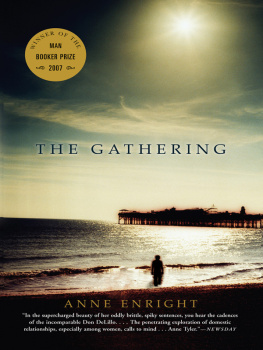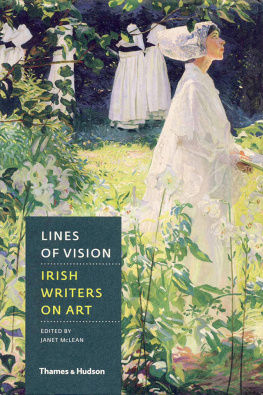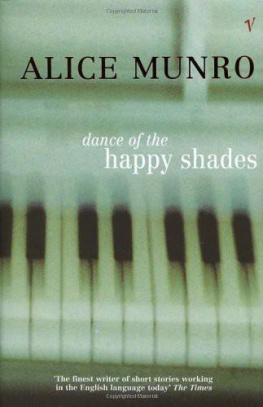Anne Enright
Yesterday's Weather
For Theo and Eileen Dombrowski
This collection brings together stories written over the course of nineteen years. It includes all of Taking Pictures (Cape 2008), much of The Portable Virgin (Secker 1991), and two stories from Fabers First Fictions: Introduction 10, which was my first outing into print in 1989.
The stories are presented here in reverse chronological order, partly, it has to be said, for the comic effect. I may be the only one who is laughing, but it is a great and private joke to see myself getting younger shedding pounds and wrinkles, gaining in innocence and affectation as the pages turn. The stories have been very lightly edited, not because I did not want to rewrite them, but because I found that I could not. It is impossible to inhabit a former self. You can not be the writer you were in 1989, nor, in a funny way, would you want to be. Still, there is much to regret the fact that the creative moment is not one that can be repeated, is both a wonderful and a melancholy one. The path your words make as you herd them across the page is the only viable route, after all.
Working on the stories, I was surprised by the pity I felt for my younger self so assured and so miserable at the same time. The best kind of misery, of course spiky, artistic, fullhearted but still, it does make you blunder around a bit.
The irony is that so much of my early work is spent discussing the woes of middle age. I got most of them wrong. I didnt imagine the many insults to your vanity that age brings, nor could I foresee the sense of urgency you get as the years go by, like typing faster before you hit the end of the page. No, I thought the most terrible thing about middle age would be marriage, in all its loneliness and hypocrisy. And I suppose marriage can be both of these things, but I have also discovered that these kinds of emotion are beside the point: the whole business has been been one of unexpected happiness, for me. Worst of all, the women in my early stories have children and say that the experience has not changed them. How wrong can you be?
It is interesting, but only in a sociological way, to see the sympathy two of my narrators have for men who have just lost their virginity. It is odd, but only to me, to read of the bitterness that exists between female friends, when my own girlfriends are so generous and important to me. These stories are not written by the person who has lived my life and made the best of it, they are written by people I might have been but decided against. They are written by women who take a different turn in the road. They are the shed skins of the snake.
None of this matters my life, and how it is reflected or distorted in the stories here. I discovered, when I started to look at them again, that I had forgotten the content of some of these pieces. What I remembered, with great clarity, was their shape. I knew whereabouts on the page the thing shifted; I remembered the moment it stumbled or lurched toward an ending. I could turn it around in my head almost in three dimensions. The stories played like music for me; the way music can give you a sense of space.
What I seem to be saying a little to my own surprise is that the person may change, but the writer endures. The writer wants a thing to be well made, because a well-made thing is a gift. This gift is presented not just to the reader, but also to the future in my case, to an old woman called Anne Enright, who will read this too, with a bit of luck, and laugh.
A. E.
Bray, 2008
The girl died.
Well, what was that to me? The girl died. And it was nothing to do with us, with either of us. She died the stupid way that people do in a car crash, in Italy. Where, presumably, she was driving on the wrong side of the road.
Silly twit.
If the girl had not died then she would not have mattered in the slightest. She would have been a lapse; my husband is prone to lapses less often of late, but yes, once every couple of years he does lapse, after the office party say, or travelling on business. I dont think he visits prostitutes I mean, some men do, some men must. Or quite a lot of men must, actually but my husband doesnt. And I know, I know, I would say that, but
Ive thought about this a lot over the years; things catch my eye in articles, in magazines. I have wondered, What makes them go and what makes them stay, what do they want, men? Its the great mystery, isnt it? What men want. And the damage they might do to get it.
The things you read in the papers.
Oh, sure theyre all the same. Isnt that what your mother used to say? Theyre all the same.
But theyre not. They have their reasons and they have their limits. They have hearts, too. And I can say, without a shadow of a doubt, that my husband is not the kind of man to buy sex in the street. He likes intimacy. That is what he craves. My husband is the kind of man who will always look you in the eye. He loves women even older ones. He loves to talk to them, and make them feel good, and he loves to kiss them, and be a little dangerous; he loves the melancholy of all that, it makes him feel so young. And he also loves me.
He is not a bastard, that is what I am saying. I am saying that he is a fantastic man. My husband is a fantastic man. And until the girl died, beetling along in her little Renault Clio on the wrong side of a road in Tuscany, until the girl died, that was enough for me. To be married to a fantastic man who loved me, and was prone, once in a long while, to a little lapse and a lot of Catholic guilt about it. Oh, the bloody bunch of flowers and the new coat in Richard Alans sale. Isnt it worth it? I used to say. Isnt it bloody worth it for a trip to Brown Thomass and a long weekend with the kids, all of us together in Ballybunion, walking the winter beach, a couple of bottles of wine and more conjugal antics than is decent at our age, with my wonderful husband, home again after his little lapse; some overambitious young one who will Shortly. Be. Fired. Thank you darling and, no, I know you will never do it again.
But actually I hated it. It was like living on a page of some horrible Sunday newspaper. Horrible people. Horrible people with their horrible sex lives and their horrible money.
No.
He works hard, my husband. And I have always been a great asset to him. And we are ordinary people. And I am proud of that too.
Ke I cant say his name. Isnt that funny?
It is quite an ordinary name, I say it fifteen times a day. Mind you, he never calls me anything back. Isnt that the way of it? What do men call their wives. Em Like every woman on the planet was christened Emily.
Em is that shirt clean?
The girl was called listen to this Samantha.
Not that I knew this at the time. Not that I knew anything at the time.
And she was only called Samantha because she died. If it hadnt been for the car crash she would have been, and always remained, that young one in IT, or even that slapper over in IT. OConnell Street might be full of slappers, but if one of them slaps off, pissed, in her mini skirt and high heels, and gets herself run over, then shes what? shes a fine young woman, who liked to wear white.
Im sorry.
But.
The poor child, who thought it was a laugh to sleep with my husband and it is a laugh, God knows I have laughed enough myself the poor child, who thought it was a laugh to sleep with the father of my three children, did something worse than all that. She went and died on him too. She went and died on us all.
Of course, I didnt have a clue.
He came home when I think about it, it must have been the day hed heard the news and he sat in the sofa, and for the first time since his mothers funeral, I saw him cry. The children saw him cry. I had no idea what he was crying for. I felt like calling an ambulance. Then I put two and two together and realised he must be lapsing again, he must be mid-lapse. And I panicked.









